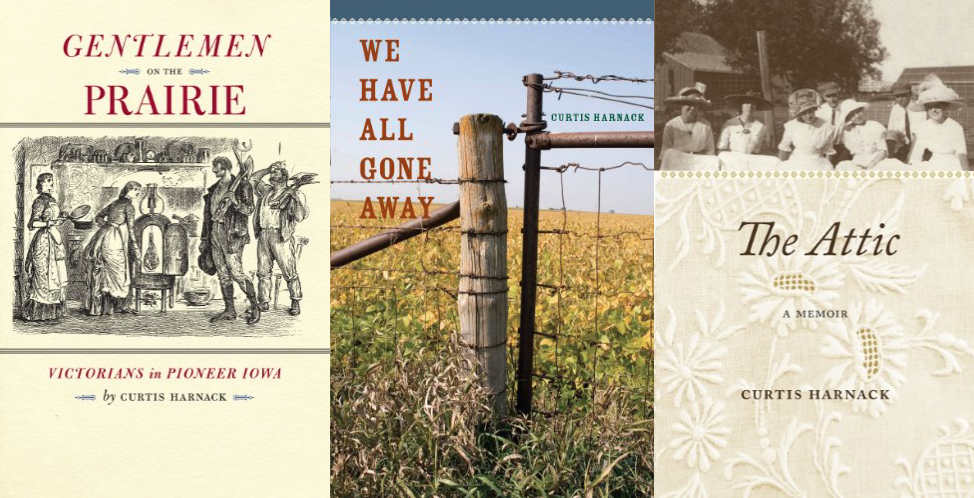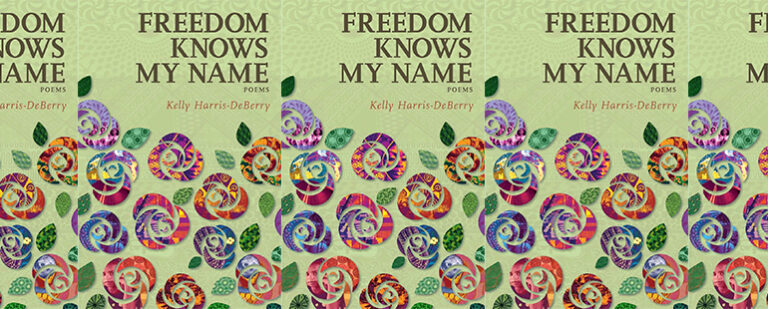Interview with Curtis Harnack

Sometimes the right thing simply happens at the right time, and everything falls into place so beautifully that it’s almost impossible to remember how you existed beforehand. So it was for me when I was accepted to Yaddo last fall, and ended up in a wonderful group of people. Among them was Curtis Harnack.
*
Born in 1927 in Le Mars, Iowa, Curtis’s childhood would one day provide the fodder for the brilliant memoir We Have All Gone Away. Not that Curtis’s writing has ever truly left Iowa behind, try as he might in his non-fiction narrative Persian Lions, Persian Lambs (1965) about a Fulbright year spent teaching in Iran. His first job was working for the United Nations. He moved on to teaching, first at Grinnell College in Iowa, then the Iowa Writers’ Workshop, and then Sarah Lawrence. During this time, Curtis wrote three books: Persian Lions, Persian Lambs and the dust-swept, Biblical novels The Work of an Ancient Hand (1960) and Love and Be Silent (1962). He also married the writer Hortense Calisher in 1959, and they remained together until her passing in 2009.In 1971, Curtis was named the president of Yaddo, a place originally recommended to him (if my memory serves) by none other than Truman Capote, on a beach. Curtis served as Yaddo president for seventeen years. While there, Curtis wrote the aforementioned memoir We Have All Gone Away (1973) and returned to the fictional rural Iowa of his previous two novels with Limits of the Land (1979).
After Yaddo, Curtis worked as president of the School of American Ballet and traveled the world. He also wrote the history Gentlemen on the Prairie and the sequel to We Have All Gone Away, The Attic. Like all of Curtis’s work, there’s a combination of heartache and hope—mostly achieved through a sly sense of humor—that resonates well past the final pages.
*
Curtis is of a generation that includes men like George Plimpton, the kind of person who seems limitless, the kind of person that doesn’t seem to exist any more. There’s an openness to their intellectual curiosity that makes them incredibly charming, and when that’s combined with their fearlessness, there’s seemingly nothing that can’t be done. Because of this, they fit in everywhere; it’s equally easy to imagine Curtis on his farm in Iowa, his apartment in New York City, and strolling the grounds of Yaddo.
I listen to Curtis, always. No one that I have ever met has stories as populated with interesting people and places, all told with a remarkable lack of pretension or embellishment. I’m not certain how the story of Curtis’s life and adventures could be made more fascinating. Car chases, perhaps? But I bet he simply has yet to tell me of a car chase he was in with Steve McQueen and Paul Newman, though I bet Curtis was riding a horse. Really, though, any story I could make up or any recounting of the stories Curtis tells and reads would do nothing but diminish them. I thought it best, therefore, to see if he would relate some of his experiences directly. I had the honor of speaking with him about Yaddo, life, writing, the University of Iowa Press reissuing three of his books, and prima donnas.
James Scott: The University of Iowa Press recently reissued Gentlemen on the Prairie, We Have All Gone Away, and The Attic. What were your emotions as that process unfolded? I think of your descriptions of reading the letters you wrote home while in the Navy years later in The Attic, and imagine reading from these books must have some similarities.
Curtis Harnack: To have three books that I wrote some time ago come back into print was wonderful, and cheering. Re-reading the two memoirs We Have All Gone Away and The Attic was emotionally difficult – it seemed so intensely personal. How could I have spilled out so much private stuff to perfect strangers who might be reading me? I think that while writing a memoir one is protected from worrying about consequences. But they can come and cause pain, as it has at times for me.
JS: Does that pain make things more difficult for you the next time you sit down to write? How do you maintain your honesty knowing that can be the result?
CH: I blank out consideration of that while writing. Later I might delete a passage if somebody vulnerable could be hurt by it, but that’s seldom. When writing fiction I can be deluded into thinking that “what really happened” has been transformed by how it’s embedded in what I’ve made up. Sometimes to my surprise I realize I didn’t change enough.
JS: Last we spoke, I think you’d just finished a novel. Where does that stand? What are you working on now?
CH: It stands on my shelf because certain things need to be done differently. But I still don’t know how.
JS: I was fortunate enough to hear you read from a new memoir about your writing life. It was like hearing from someone who played for the ’27 Yankees—everyone became a legend. How’s that coming along?
CH: It needs to get out of my hands soon, I think. When I was doing the research for Gentlemen on the Prairie and living in England (on leave from running Yaddo), the biographer Michael Holroyd told me, after I’d described what I was doing: “When you’ve got twice the material you’ll ever use it’s time to sit down and write the book.” Now the memoir is finished! I must stop adding bits here and there.
JS: There must have been many moments, looking back on it all now, that meant a lot to you as a writer, even though they didn’t seem that big at the time. Can you share one or two?
CH: John Cheever once remarked that it takes only reading a few sentences of a book to know whether the writer is any good.
My girlfriend while in graduate school at Columbia was a friend of e.e. cummings and his wife. When I told Cummings I was working on a novel he said he hoped I would take full advantage of the novel’s multiple ways of telling a story simultaneously, not just settle for a few, as some writers did.
In response to sending Wallace Stegner my second novel, Love And Be Silent, he wrote: “The voice I hear in you is a fine one. . . you’ve got an ear, for which you should kneel morning and evening and praise the Lord.” That was news to me.
JS: I love Wallace Stegner. That must have been a huge thrill—and an engine to keep you going.
What was the most surprising memory or emotion that you unearthed during the writing of a book?
CH: For the memoir, We Have All Gone Away, I was getting information from older family members such as Aunt Lizzie, my dead mother’s sister. She said my mother couldn’t marry the man she had been expecting to because his family disapproved. During the frontier period her Uncle Nick had shot and killed a man. My mother was furious that her intended would end their alliance for such a reason. And so, the man who was to be my father became the substitute. Then Aunt Lizzy showed me a knick-knack in the curio-cabinet, which my Great Uncle Nick had made while in prison. All my childhood I had seen that artifact — but never knew the story behind it.
JS: That’s the kind of story I have no answer to, but I will just type, “Jaw dropped.” One thing that struck me is just how many writers you have been around in your writing life. Can you tell us a bit about your biggest influences, not just as words on a page, but as living, breathing humans?
CH: While in graduate school at Columbia I met Dylan Thomas, who was “living, breathing” (and drunk). Professor Mark Van Doren asked me and a classmate to fetch him by taxi from the Chelsea Hotel, just to be sure he got to the scheduled poetry reading. We found him in the bar, looking bleary-eyed and disheveled, and told him that a taxi was waiting. He said, in that organ-toned voice, that the woman on the next stool was his wife (though I knew she wasn’t). She must come along too. Okay, I said. In glee he grabbed her thigh but almost fell off the stool. I thought, “Fern Hill” came out of THIS man? How could it be? I knew there was a difference between art and life but at that time couldn’t believe it – though now had to.
For me, words on the page were the main influence on my writing – Midwesterners especially, Twain, Sherwood Anderson, Cather, Hemingway, Dreiser. Being married to a well-known writer, Hortense Calisher, whom I met at the U. of Iowa Writer’s Workshop where both of us were teaching, some of our writer-friends were part of The New Yorker world of the time. In my new memoir I go into a few of those associations and how they helped – or didn’t.
JS: I cannot wait. You mentioned your marriage, and we don’t need to get too personal, but in terms of your writing, what kind of impact did it have? It takes a very strong person, I think, to be with another artist who does what they do.
CH: We came from very different worlds, she urban, Jewish, sophisticated; me a Midwest farm guy. She had her special writing sources and I had mine. For instance, early on she was surprised by the cornfields in Iowa and wondered why so much corn was needed for human consumption (I told her pigs and cattle ate it, having experience in that). I was unfamiliar with a lot of things in New York and enjoyed learning the ropes from her. We didn’t get involved in each other’s writing or even see work until it was done and ready to be sent out. That scheme seemed best for us.
JS: How do you manage to work in both fiction and memoir? Aren’t you tempted to fictionalize pieces of the memoirs? Don’t you find one constricting after writing the other?
CH: One has to stick to the genre you’re in. The memoir allows for one’s particular take on things, but you cross the line if you knowingly make something up. My siblings had different versions on a few incidents that I report in We Have All Gone Away. Impressions can vary, especially in a family. At the time of writing I did hesitate regarding a scene that happened in 1933, when violence erupted on the farms. I recalled touching a bullet hole in the rear of an auto. Only six years old then, I’d been lifted up to feel it. Maybe I imaged that, I don’t know. But I left it in as a valid memory.
JS: With so many new books coming out all the time, but also with access to more and more information, who are some authors you think should be more widely read? Could you perhaps name some titles that have gone out of print that you just can’t believe people can’t just go out and buy?
CH: Yes, it’s sad. At a library sale, de-accessioning the volumes that hadn’t been checked out enough, I once picked up a handsome set of Jane Austen. I went into the library and asked: “Are you seriously doing this?” They said people want the new, so this is how libraries pay for the new books. It’s the world we’re in now.
Larry Woiwode is one writer I think should be better known than he is now.
JS: I know! Sometimes I see books on the street in cardboard boxes. How big is your library? Any prized possessions?
CH: My library is a mess, can’t find anything. Some of it is in the upstate house, which has most of my teaching-connected books. The rest is in the New York apartment. I always believed books are for reading and was never interested in getting prized items. Hortense felt that way, too. She had first editions of The Catcher in the Rye and Augie March but decided to throw away the book-jackets and now those novels have no value in the rare book market. I don’t mind – they’re on the shelf.
One winter holiday we took the train from Saratoga to Seattle, and I brought along old paperbacks to read on the way. Orwell’s Burmese Days was falling apart; every page came out in my hand and after I’d read both sides I tossed it in the trash. I seem to remember that book better than most. Maybe our current loss of traditional books will some day make them seem more precious.
JS: You may have found a new studying tactic—throwing out each page as you read it. How did your seventeen years at Yaddo impact your work? Your career?
CH: Prior to Yaddo, the eighteen years I spent teaching in universities was the more usual route for writers and poets. But I found running Yaddo a good choice. I could work three hours first thing in the morning and then spend the rest of the day with problems to solve in the “real world.” I learned a lot of things and found it nourishing for writing. I had four books published while at Yaddo.
JS: Bigger prima donnas: writers at Yaddo or students at the School of American Ballet?
CH: The big difference is: the Yaddo inmates are mature adults, whereas the ballet kids are teenagers. All artists have to have determination and drive. I don’t think prima donnas are tolerated in either place. At Yaddo some of the residents who had reputations of being “difficult” in various ways often turned out to be pussycats.

